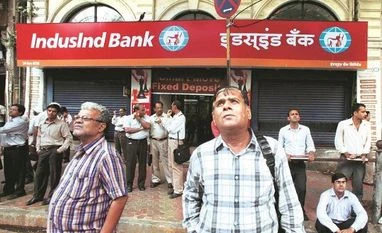IndusInd Bank shares fall on derivative discrepancy; Crisis explained here
IndusInd Bank Shares: The forex transaction development, which follows a less-than-expected extension given to managing director Sumant Kathpalia, has shaken investor confidence
)
IndsuInd Bank News Today: The accounting mismatch boosted IndusInd Bank's NII over the years, but suppressed the actual trading losses
Listen to This Article
IndusInd Bank Forex Portfolio News Explained: India’s fifth largest private bank, IndusInd Bank, has been hit by a major accounting discrepancy. The lender, on Monday, informed its shareholders that an internal review of forex derivative transactions has unearthed an accounting mismatch worth Rs 1,577 crore (post-tax), which is about 2.35 per cent of the bank’s net worth at the end of December 2024.
The development, which follows a less-than-expected extension given to managing director Sumant Kathpalia, has shaken investor confidence. On Tuesday, IndusInd Bank share crashed 27.17 per cent on the BSE, recording its biggest one-day fall since listing. The stock ended at Rs 655.95 per share, its lowest level since November 2020.
On Wednesday, however, the stock was back in the green, up over 5 per cent at Rs 691 per share on the BSE, at 10:15 AM, recovering from an 8-per cent decline logged in morning deals.
Meanwhile, this is not the first time a private bank has come under fire for its financial woes. Previously, YES Bank was on the brink of a collapse after it was burdened with huge non-performing assets (NPAs), coupled with low liquidity coverage ratio (LCR). Back in 2020, YES Bank’s LCR had dropped to 37 per cent of the total cash outflow over the next 30 days, while the GNPA ratio as was high as 16.8 per cent. The lender’s return on assets had plunged to 7.1 per cent.
On similar lines, the Reserve Bank of India (RBI) has taken actions against several financial institutions, including Aviom India Housing, New India Co-operative Bank, Laxmi Vilas Bank, IL&FS, Diwan Housing Finance Corporation (DHFL), and Punjab and Maharashtra Cooperative Bank (PMC) due to accounting and governance issues. ALSO READ: At what level does IndusInd Bank stock become a Buy? What analysts say
Also Read
Meanwhile, what happened at IndusInd Bank is that it has noticed deficiencies in its derivatives accounting transactions, done prior to April 1, 2024. While internal estimates peg the hit at Rs 1,577 crore, it has appointed an external agency to independently verify the loss.
But, what does the derivative accounting mismatch mean? Here’s an explainer:
Typically, if a bank is taking a foreign-currency exposure, its trading desk must hedge (take an opposite position in the related transaction to cover losses, if any) while converting it into rupees.
As this process involves a cost, the trading desk transfers the cost to the asset-liability management (ALM) desk. When the foreign currency exposures are repaid, there could be either a gain or loss.
IndusInd Bank, on its part, internally hedged forex borrowers by entering internal derivative contracts with its trading desk. The trading desk then hedged this exposure externally in the market.
External trade was marked to the market (MTM), which means that the value of the trade fluctuate with market rates. This negatively affected the profit and loss (P&L) account. ALSO READ: IndusInd Bank stock outlook: Chart shows 30% fall, can slip to Rs 500-mark
The internal trade, meanwhile, was accounted for using swap cost accounting or swap valuation, affecting asset book instead of P&L. External trades moved with the market, but internal ones followed swap valuation, which might not reflect market movements.
This mismatch boosted the bank’s reported net interest income (NII) over the years, but suppressed the actual trading losses. The real impact surfaced when the trade was unwound or matured.
Further, the RBI's "Classification, Valuation and Operation of Investment Portfolio of Commercial Banks (Directions), 2023," rules, which came into effect from April 1, 2024, made it difficult for the bank to comply with the norms due to its accounting practices.
While most other banks compiled with the rules by June 2024, IndusInd Bank couldn’t do it until November last year, ballooning the losses.
IndusInd Bank’s Management Crisis
Besides the accounting discrepancy, the bank has been hit by a management churn.
Just before the lender was scheduled to report its December quarter results, its chief financial officer (CFO), Gobind Jain, tendered his resignation.
Now, the RBI has extended incumbent MD and CEO, Sumant Kathpalia’s tenure by just one year, instead of the proposed three-year period suggested by the Board. The action, as per Kathpalia, is likely due to the same accounting mismatch.
What analysts are saying about IndusInd Bank?
Most brokerages have downgraded IndusInd Bank’s stock due to lack of earnings visibility.
While the bank has appointed an external agency to look into the deficiencies and assess the impact, they remain concerned if the worst is over or if there is more in store.
“Given the recent events, we are finding it difficult to make an assessment, and, thus, the bank is staring at significant risk of an earnings downgrade,” Elara Capital said in its report. It has downgraded the stock to ‘Sell’ from ‘Accumulate’.
More From This Section
Topics : IndusInd Bank Markets Buzzing stocks Market news
Don't miss the most important news and views of the day. Get them on our Telegram channel
First Published: Mar 12 2025 | 11:58 AM IST